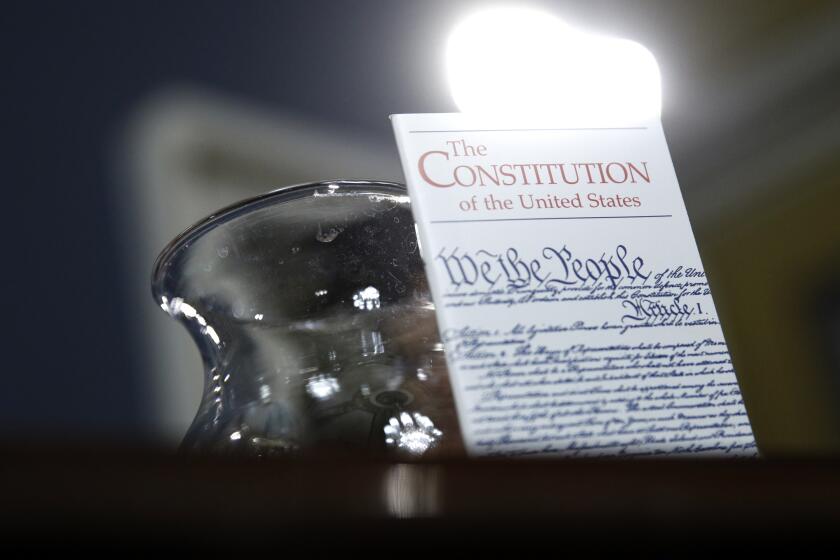Opinion: Why Biden’s really bad approval ratings don’t matter

- Share via
Over the weekend, a new Washington Post-ABC News poll showed President Biden’s approval rating at 36% and had him down 7 percentage points in a head-to-head matchup with Donald Trump. Right on cue, the Washington media establishment went into overdrive, characterizing the poll numbers as “bleak” and “brutal.”
It wasn’t that long ago that similar assessments were made for the Democrats in the run-up to the midterm elections. “Joe Biden’s poll numbers are in a very bad place for Democrats,” CNN pronounced in late October. “How well will Biden’s low approval explain the midterm results?” was a headline that appeared in the Washington Post on election day.
Of course, the conventional political analysis was completely wrong about the midterm elections. Democrats ultimately gained ground in the Senate and, by the narrowest of margins, lost the majority in the House. The results were a far cry from Republicans flipping 60 House seats as they had been crowing about.
It turns out, there was absolutely zero correlation between job approval polls on Biden and the outcome of the midterm elections. So why in the world is the political media so quick to jump right back on the polling bandwagon six months later?
The reality is, in this day and age, the way we interpret polls has got to change. There needs to be a recognition that, realistically speaking, the days of a president enjoying approval ratings above 50% are effectively over. The Republican Party has withdrawn from the democratic experiment, choosing instead to rally behind insurrectionists and white nationalists. On what planet would any of those people “approve” of a Democratic administration under any scenario? They don’t even think he was legitimately elected president. (He was).
Disinformation has contaminated the town square. Thoughtful debates and honest disagreements have been replaced by disingenuous bomb throwers and wack job conspiracy theorists. Real analysis has been abandoned in favor of false equivalencies. Facts are being drained out of our political discourse. The result is a large share of the electorate that’s uninformed or, worse, actually persuaded that lies are truth.
Yet somehow, the elite media are still giving their polls the same credence they did before Trump and the era of misinformation began. You cannot accurately evaluate today’s political figures with the same tools and methodologies you used a decade ago.
Those very tools told us there was no way Trump could become president in the first place; they were wrong. The pundit class left Biden’s campaign for dead in early 2020, yet he was just getting started. Those same polls told us a massive red wave was going to hit the country in November 2022; it didn’t. Given this track record, is it really surprising that trust in media remains at an all-time low? Half of Americans believe the media deliberately misleads them and considering how the press treats polls, it’s not hard to understand why.
The 2024 presidential election is sure to be overrun with misinformation. There couldn’t be a more important time for the press to play a central role in deciphering what is real and what is not, to filter what is important and what is just noise. Getting it right has never been more important because with every election cycle the press gets wrong, its credibility declines with the American people. And that diminished credibility coincides with the rise in disinformation and the empowerment of bad and dishonest actors.
We simply don’t live in a world where 55% or 60% of this country is going to agree on a political figure’s job approval. The media and their polls need to acknowledge that reality, instead of using this obsolete measurement to drive news cycles and fuel cable TV segments. This pointless exercise will only injure the media’s sagging reputation and make it easier for the purveyors of misinformation to fill the vacuum.
Kurt Bardella is a contributing writer to Opinion. He is a Democratic strategist and a former senior advisor for Republicans on the House Oversight Committee. @KurtBardella
More to Read
A cure for the common opinion
Get thought-provoking perspectives with our weekly newsletter.
You may occasionally receive promotional content from the Los Angeles Times.










